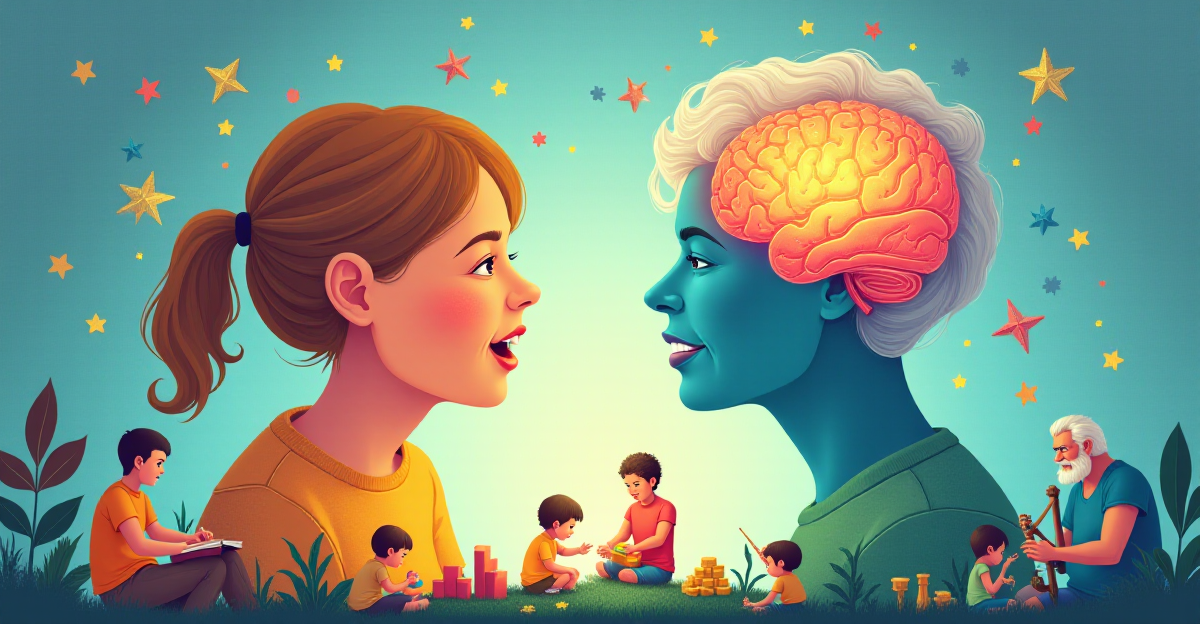Over 25 years of research reveals a link between early intelligence and later in life brain health. This paper will explore possible causes for the relationship between early cognitive capacities and mental resilience as well as how they relate to one other. Neuroscience insights help readers to better grasp how teaching strategies could affect long-term brain condition. It also offers doable strategies for teachers and parents fostering cognitive growth. A personal reflection on how early events impact lifetime learning.
Table of Contents
- The Connection Between Childhood Intelligence and Aging
- Key Factors in Long-Term Brain Health
- Ways to Encourage Cognitive Development Early
- Extra’s:
The Connection Between Childhood Intelligence and Aging

Have you ever encountered someone whose mental and physical aging seems to be graceful while others see their cognitive capacity declining? One could question what distinguishes them. As it happens, early intelligence is really important in determining our aging process. It’s like an investment; the more we develop our mental abilities in childhood, the better profits we get in our older years. The interesting link between early cognitive development and general well-being will be discussed in this paper together with ways in which each of us may gain from this knowledge.
The Power of Early Learning and Resilience
Have you ever pondered how some people remain sharp well into their elderly years? Often it comes from the resilience they cultivated throughout childhood. Resilience in the context of human brain is its capacity to preserve cognitive ability, adjust to novel circumstances, and recover from adversity. Engaging our minds during childhood promotes our brain development, much as physical activity tones our muscles.
Imagine a youngster who likes solving difficult puzzles or reading advanced books. They are laying a good basis for their future cognitive ability, not only enjoying themselves. Their minds are being tested, worked upon, and stimulated, therefore strengthening their adaptability and resilience. Childhood’s cognitive development results in increased ability for general well-being and lower likelihood of cognitive deterioration later in life. For example, my grandma stayed alert and involved long into her 80s as she always loved reading and crossword puzzles. Her cognitive skills were preserved over her life by her passion of learning.
The Educational Impact of Early Brain Development
Understanding how much intensity affects general well-being, teachers have a great chance to help their pupils to define their futures. Teachers may provide children the tools they need to flourish intellectually and academically by design interesting learning environments that support cognitive growth.
The emphasis on neuroscience in education serves as one instance of this strategy. The study of the brain and nervous system, neuroscience is finding use in education more and more to help to clarify how best children learn. Understanding how brain development happens will help teachers create instructional activities targeted at particular parts of the brain, therefore improving memory, reasoning, and other vital cognitive abilities.
Imagine a youngster who enjoys learning languages, for instance. Engaging many areas of their brain helps them to increase their brain development in addition to increasing their vocabulary and improving their communication abilities. Because of their long-lasting advantages, this cognitive development helps one to be more flexible in demanding new tasks and surroundings.
It is especially our great duty as teachers and parents to help youngsters to develop their cognition. Giving them the correct tools and chances will help them to be lifetime learners, flexible, and generally healthy. Every puzzle solved, every book read, and every new language acquired adds to a better future—one with a more resilient spirit and a sharpening mind.
Key Factors in Long-Term Brain Health

Have you ever considered how best to maintain mental clarity as you grow older? Many of us wonder this, and fortunately, an increasing amount of studies point to our active ability to affect our long-term brain health. Although our genes play a part, research reveal that the strength and resilience of our brains during life are much influenced by our early events and decisions.
Consider it this: Imagine a small youngster who enjoys creating intricate Lego buildings, playing strategic games, and investigating novel ideas. You challenge them, keep their childhood intelligence, and continually activate their brain. These early learning events lay a basis for a mentally nimble brain—one that can adapt, learn, and retain knowledge with increased ease as we age—just as a muscle gains strength from exercise. This educational impact enables us to acquire fundamental abilities needed for success both in the classroom and beyond. Crucially for negotiating the complexity of life, these talents comprise memory, reasoning, and problem-solving.
Imagine a child, for instance, who grows up surrounded by several languages. They might pick up simple Spanish vocabulary, pick up French words on family vacations, and even play around in Mandarin. Though kids seem to be only learning languages, they are also creating brain connections that improve their cognitive flexibility, information processing speed, and situational adaptability. Neuroscience studies show how much early brain development influences our long-term cognitive capacity. We give a child the tools they need to flourish psychologically all their life by fostering their curiosity and discovery. Long-term health and well-being depend on this attention on childhood intelligence and educational impact.
Ways to Encourage Cognitive Development Early

Imagine a small child, maybe four years old, seated on the ground surrounded by vibrantly colored blocks? She is building, not merely playing, a tower that towers above. She is developing balance, spatial thinking, and problem-solving as she meticulously stacks every block. One striking illustration of how early events can affect a child’s brain health and cognitive development is this basic act of play.
Early life is a crucial stage for brain development, when the brain is like a sponge collecting knowledge and creating connections at an amazing speed. A child’s future cognitive ability, mental resilience, and general well-being can be much influenced by what they go through throughout these formative years. Here is where neuroscience comes in handy since it provides insightful analysis of how our brains develop and how we may help youngsters’s cognitive progress.
Fostering Curiosity and Exploration
Curiosity in a child is like a spark, a flame lighting their road of learning. Encouragement of this natural curiosity will enable children to grow to have lifetime love of learning.
Promote open-ended play: Could you arrange a basic science experiment at home? Allow your youngster to investigate water’s characteristics by combining several ingredients—such as soap or salt. This is an entertaining approach to pique their interest and teach them to fundamental scientific ideas.
Read aloud often. Not only should you read the words; bring the narrative to life. Create sound effects, use several voices for the characters, and probe your youngster about the narrative. This can assist in their development of language skills, vocabulary, and imaginative capacity.
Ask open-ended questions. Try posing “What was the most interesting thing you learned today?” instead of just asking, “What did you do at school today?” This fosters a love of knowledge and more thorough thought. You could also ask them to clarify their reasoning behind particular decisions they made during a game or activity.
Children’s sense of wonder can be developed by exposing them to many cultures, artistic expressions, and settings. A trip to a museum, a stroll in a park, or even a visit to a neighborhood farmer’s market might present a plethora of educational possibilities.
- Nurturing a Love of Learning
Youngsters who enjoy studying will be more likely to welcome it all their life. These ideas will help you grow this love:
Create Learning Fun: Could you perhaps make learning a family game? Organize a scavenger hunt all around the house using riddle or object identification hints. This is a great approach to involve kids’ brains and create pleasurable learning environment.
Celebrate Their Success: Regardless of how little, recognize their work and development. Good reinforcement fosters a passion of learning. You might exclaim, “Wow, you picked the names of every planet! You really make me very proud.
Connect Learning to Their Passions: Search books, documentaries, and activities connected to a child’s love of dinosaurs. This demonstrates to them that, even in relation to their hobbies, “learning” may be interesting and enjoyable.
Let kids investigate and test fresh ideas even if they make mistakes. Learning involves mistakes; so, by letting kids make mistakes, we help them grow resilient and ready to try novel activities.
Long-Term Health Benefits of Cognitive Development
Strong “cognitive abilities can have a long-lasting educational impact” on a youngster’s life. They are more likely to excel in the classroom, grow to have good social skills, and make wise decisions in their life. These cognitive qualities can help individuals keep “mental resilience and cognitive ability” as they age. This is so since a well-developed brain is more suited to manage aging’s difficulties like cognitive decline and memory loss.
Nurturing a child’s “brain health and cognitive development” depends critically on early life. Giving children exciting events and chances for learning can help them grow to be successful not only in their early years but also as they travel through life.
Extra’s:
The brain’s development during childhood is a critical period that lays the foundation for cognitive function throughout life. A stimulating environment rich in learning opportunities can foster cognitive reserve, which may offer protection against age-related cognitive decline. If you are interested in the fascinating connection between the gut and health, you can explore our post “Gut Microbiome Changes and Their Role in Rheumatoid Arthritis Prevention” for a deeper understanding of how the gut microbiome can influence the immune system and overall health. This can help you understand how early-life influences can impact overall health later in life.
The long-term benefits of early childhood development extend beyond cognitive function and encompass physical and mental well-being. Research suggests that positive childhood experiences may have a lasting impact on brain health and cognitive function in later life. For a comprehensive understanding of the link between childhood experiences and cognitive function in later life, explore the research published in PMC titled “Are Positive Childhood Experiences Linked to Better Cognitive Functioning in Later Life?: Examining the Role of Life Course Pathways – PMC“. Similarly, another study published in PMC, titled “The positive impacts of early-life education on cognition, leisure activity, and brain structure in healthy aging – PMC“, emphasizes the role of early education in promoting healthy cognitive aging.












2 thoughts on “How Childhood Intelligence Influences Brain Health in Older Age”